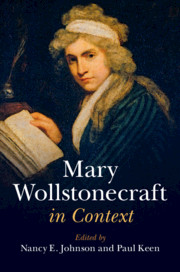Book contents
- Mary Wollstonecraft in Context
- Mary Wollstonecraft in Context
- Copyright page
- Contents
- Illustrations
- Notes on Contributors
- Preface
- Frontispiece
- Chronology
- Part I Life and Works
- Part II Critical Fortunes
- Part III Historical and Cultural Contexts
- The French Revolution Debate
- The Rights of Woman Debate
- Philosophical Frameworks
- Legal and Social Culture
- Chapter 23 The Constitution
- Chapter 24 Property Law
- Chapter 25 Domestic Law
- Chapter 26 Slavery and Abolition
- Chapter 27 The Bluestockings
- Chapter 28 Conduct Literature
- Chapter 29 Theories of Education
- Literature
- Suggested Further Reading
- Index
Chapter 24 - Property Law
from Legal and Social Culture
Published online by Cambridge University Press: 16 January 2020
- Mary Wollstonecraft in Context
- Mary Wollstonecraft in Context
- Copyright page
- Contents
- Illustrations
- Notes on Contributors
- Preface
- Frontispiece
- Chronology
- Part I Life and Works
- Part II Critical Fortunes
- Part III Historical and Cultural Contexts
- The French Revolution Debate
- The Rights of Woman Debate
- Philosophical Frameworks
- Legal and Social Culture
- Chapter 23 The Constitution
- Chapter 24 Property Law
- Chapter 25 Domestic Law
- Chapter 26 Slavery and Abolition
- Chapter 27 The Bluestockings
- Chapter 28 Conduct Literature
- Chapter 29 Theories of Education
- Literature
- Suggested Further Reading
- Index
Summary
In her author’s Preface to The Wrongs of Woman; or, Maria, Wollstonecraft declares that her aim is to expose “the misery and oppression, peculiar to women, that arise out of the partial laws and customs of society.”1 From her first major work, the Vindication of the Rights of Men, and throughout her writings, Wollstonecraft attacked the property system, upheld by numerous laws, which structured British society in the late eighteenth century, and where the dependent state of women was enshrined. The “prejudices of mankind” which, as Maria reflects in Wrongs of Woman, made women the “property of their husbands” was not merely a consequence of socially dominant ideologies of gender, but was formally instituted by property laws which, through the common-law notions of coverture and primogeniture, neither recognized the independent existence of a married woman, nor regarded daughters as equal in status and expectation to sons.2 This essay explores, first, the significance of property in eighteenth-century Britain; secondly, the complex legal landscape of property law; and finally the repeated and detailed criticisms, often of particular laws and their effects, which Wollstonecraft offered in her writing.
- Type
- Chapter
- Information
- Mary Wollstonecraft in Context , pp. 207 - 214Publisher: Cambridge University PressPrint publication year: 2020



